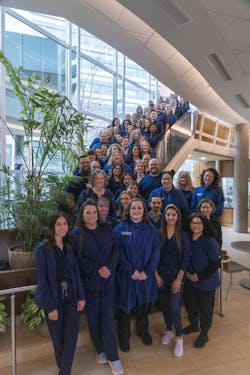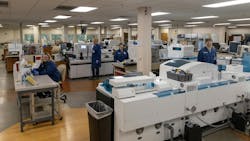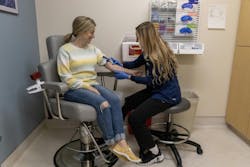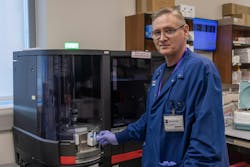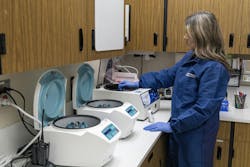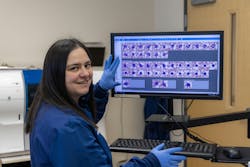Salem Health Laboratories at Salem Health Hospitals and Clinics — Continuous and sustained commitment to excellence
Medical Laboratory Observer’s 2024 Lab of the Year is the Salem Health Laboratories at Salem Health Hospitals and Clinics. Salem Health Laboratories employs 226 people and handles 1.6 million test requests at its three high-complexity laboratories; the laboratories also support and oversee all point-of-care testing across its health system. The health system includes Salem Hospital, a 502-bed, level II trauma center in Salem, Oregon and West Valley Hospital, a 25-bed critical access hospital in Dallas, Oregon. The health system also includes Salem Health Medical Group, which provides primary care and specialty services throughout the health system’s five-county service area.
MLO received many outstanding nominations for the 2024 Lab of the Year. However, Salem Health Laboratories’ sustained commitment to improving laboratory quality and services made it stand out. Lean management is used to support the overall laboratory quality management program, and all 226 employees lead and complete a process improvement project during the year. The laboratory staff believe that if they have good processes and well-designed systems, they will consistently achieve high-quality outcomes.
Lab of the Year nominations are judged on achievements across five categories: customer service, productivity, teamwork, education and training, and strategic outlook. Salem Health Laboratories’ achievements in each of these categories follows.
Customer service
In January 2023, the laboratory went live on Epic Beaker. The multi-year project to replace the legacy laboratory information system (LIS) resulted in full integration of laboratory services with Salem Health’s Epic medical record. This integration improved communication of orders to the laboratory, useability of pathology reports by clinicians, and distribution of results to clinicians and patients.
While the full integration of the LIS with Salem Health’s medical record has improved workflows and provided a complete patient record, the new LIS has improved access to laboratory results to everyone in the community. Prior to the conversion, none of the providers in the laboratory’s community were able to submit orders electronically to the LIS — each order had to be hand entered. Test results were made available electronically to only 16% of the clinics the laboratory served. The remainder of results were issued via facsimile, which is still very common in laboratory outreach.
The new LIS also improved useability of anatomic pathology reports. Like many health systems, Salem Health Laboratories partners with anatomic pathologists, who are an independent practice. The new LIS upgraded the interoperability between the pathologists and Salem Health Laboratories by integrating rich format pathology reports and images, whereas previously, the lab was only able to capture unformatted textual data. This has improved the useability of the pathology reports by clinicians throughout the health system.
Previously, in Oregon, state law limited a laboratory’s ability to provide results directly to patients. The patient’s provider was primarily responsible for sharing results with patients. With the implementation of the 21st Century Cures Act, the Oregon law was amended to allow all laboratory results to be available directly to patients. In 2023, the number of patients electronically interacting with their laboratory results reached 80%. Now, patients and their providers can see results together, which improves outcomes and allows patients to be full partners in their care. As Salem Health Laboratories continues its work to increase patient engagement with the laboratory, it is now exploring methods to allow patients to pre-schedule lab visits and complete insurance verification prior to arriving in the laboratory.
Productivity
This past year, Salem Health Laboratories participated in two significant performance improvement initiatives. The first was to improve on-time collections for inpatient morning rounds. The second was to reduce medically unnecessary testing in preoperative patients.
The laboratory’s work to improve on-time collections for morning rounds contributed to the overall goal to improve patient length of stays post-pandemic in the Salem Hospital. On-time collections ensure that results are available to physicians first thing in the morning so that they can make treatment and discharge decisions. By working with its partners throughout the medical center, the lab discovered that if results posted to a patient chart after the physician had already seen the patient, it could delay care and discharge decisions by up to six hours. At baseline, the laboratory was performing on-time collection of morning rounds only 66% of the time.
Utilizing Lean process improvement to review this process, the phlebotomy teams identified three drivers that were key to successful on-time collections. The first driver was the number of patients hospitalized during morning rounds. The second driver was the number of patients under isolation precautions. And the third driver was the availability of team members to collect specimens.
Through job breakdown analysis, the team identified the amount of time needed to perform collections, how many minutes the amount of time increased when caring for patients with isolation precautions, and how many collections a phlebotomist could do to determine an appropriate workforce to perform these collections. With a clear understanding of the process, the team created a predictive tool based on these drivers. Each afternoon, the phlebotomy teams across the organization assess the number of hospitalized patients and evaluate the staffing for the next shift, including unplanned absences, etc. The tool informs the team if they have enough resources to complete rounds on time and allows them to react the day prior to ensure that collections can be performed on time and results available when physicians are on the unit with their patients. Now, utilizing this tool, the lab has been able to increase on-time collection of morning rounds to 98% of the time. And, on the rare occasion where they have not met their goal, they have reduced the amount of time they were late from an average of 62 minutes to only 16 minutes. This work contributed to an overall reduction of 4.8% in average length of stay across the hospital over 12 months.
In the second project, the laboratory medical director and one of the laboratory managers participated in Salem Health’s Physician Leadership Institute (PLI). As part of the lab leaders’ participation in PLI, they completed a quality improvement project, setting a goal to reduce preoperative Type and Screen testing by 50% by December 31, 2023, in patients undergoing vascular surgery. By reviewing current performance, the team identified that preoperative blood bank testing for open carotid vascular surgery patients was unnecessary 91% of the time. The team estimated that the cost to each patient of this unnecessary testing was between $274–$368 per episode. Additionally, unnecessary testing diverts laboratory resources that can be utilized to improve patient care. Through review of current literature, the team discovered that presurgical type and screen was frequently obtained, because the surgical procedure was considered an intermediate risk for blood loss. However, current literature also showed that patients require transfusion only 1.7% of the time, and in a single institution study with a cohort of over 1,500 patients, transfusion was used less than 5% of the time for patients undergoing this procedure. This knowledge allowed the team to challenge assumptions that presurgical type and screen testing was essential to the care of these patients.
The team developed a simplified algorithm, that classified patients with a hematocrit below 30% as at risk. Patients that had a presurgical hematocrit above 30% were more likely to tolerate the procedure successfully, without transfusion. During their study period, the team also monitored the use of emergency release or urgent transfusion in patients who did not have a preoperative type and screen. Zero patients required emergency release or urgent transfusion when their preoperative hematocrit was above 30%.
As a result of their work, the team surpassed their initial goal and reduced unnecessary preoperative transfusion testing by 73%, with an estimated annual savings of over $13,000.
Teamwork
In 2023, 100% of laboratory staff led and completed a Lean process improvement project, calling this work, “Lean to the Front Line.” This front-line commitment to improvement and the empowerment of employees to be in control of their work sets Salem Health Laboratories apart. To achieve sustainable improvement, employees must work together as a team. Some of the improvement projects are laboratory centric and affect a small team. Other projects stretch across the health system, involving multiple teams and many people.
An example of this work was partnering with two other clinical departments to improve communication and teamwork. Microsoft Teams chat was implemented to assist with communication. With the pharmacy team, the lab targeted improving the environmental cultures process. Before this work, the lab was successful in completing cultures only 10% of the time. With the improved communication on when cultures were being started and completed, the lab improved completion to 100%, with no failures.
With the infusion and wound clinic, the lab was struggling to ensure that blood product was ready and available for transfusion when the patient had a scheduled appointment. The lab identified that everything was ready for patient care only 70% of the time. Using Teams chat to improve communication, the lab was successful in getting blood products ready for patient appointments 100% of the time. And, while there is a quality component to these projects, they also had a financial impact. All staff quality projects combined saved Salem Health Laboratories over $4 million last year.
Education and training
In 2023, 82% of the laboratory’s leadership positions were filled with internal candidates. Not only does this practice promote career growth within the organization but builds stronger teams. Each new leader on the laboratory’s team participates in a formal leadership training pathway. They receive training in the Lean management system and participate in laboratory-specific training on the strategic plan, future planning, financial management tools, and high-reliability culture. They also receive support on developing their personnel and how to lead in an area where they may not be the subject matter expert. The outcome of this work is that leaders can successfully support their teams. Leaders that have gone through this process have an easier transition into leadership and they feel supported in their development. As they apply what they learn, their teams experience a better transition without experiencing a significant decline in support because of a new leader.
In 2023, Salem Health Laboratories launched an internal development pathway for all its employees. While some of employees are enrolled in local programs, the lab has leveraged online Medical Laboratory Science programs to help its employees have another pathway for career growth. Employees apply to be part of the formal program, which includes support for flexible scheduling to allow them to attend online classes. It also ensures a place to complete their clinical rotations, as the laboratories partner as a clinic site with the online program. Additional support is given with an assigned mentor, so the student has someone to help them and encourage them to complete their program. The hospital provides test proctoring services, so students can participate in exams. Last fall, the lab welcomed its first three employees into this program.
In addition, all of Salem Health Laboratories routinely host students from local medical laboratory education programs. By rotating them among the laboratories, students see how the different-sized laboratories function similarly and differently. This program also includes preceptor support. Laboratory staff meet with students regularly to get their feedback and to support them as they complete their rotations. Salem Health Laboratories has employed 100% of the students upon completion of their degrees.
Strategic outlook
Improvements in the laboratory are not possible without a strong strategic outlook. As the Salem Health laboratory staff worded it, “We believe it is critical for laboratory staff to know who they are, what they want to become, and to do it well and have fun.” The two primary goals of the strategic plan are to deliver a consistent and highly reliable patient and provider experience that is aligned with and supports the strategic goals for Salem Health Hospitals and Clinics and to develop a team of staff and leaders who have the skillset to support the future of laboratory services.
The laboratory’s strategic plan is built on a foundation of the following characteristics:
· Aligned leadership
· Standard procedures
· Aligned instruments
· Training and competency
· Shared accreditation
· Staff recruitment and well-being
· Student program and career pathway
This past year, Salem Health Laboratories realigned all laboratory functions under one leadership structure and all locations now operate together as a single laboratory system, bringing quality and regulatory oversight together. Bringing all laboratory operations together into one structure allowed them to review policies and procedures and align them with shared best practices — spreading these best practices throughout the organization.
This alignment of operations required cooperation. The laboratory leadership team meets weekly to discuss issues and initiatives and to benefit from the combined experience of every member of the team when moving forward. The regular meetings ensure protected time each week to work towards strategic goals. Sometimes they meet for less than 30 minutes and other times longer. This regular forum has become a place for innovation and partnership.
Closing
Medical Laboratory Observer is proud to award the 2024 Lab of the Year to Salem Health Laboratories. Its commitment to providing high-quality laboratory services, continuous improvement, and fostering a culture of teamwork is very impressive and inspiring. When we shared the news with the laboratory, its leadership expressed the following sentiments about this hard-working laboratory in Oregon:
Director, Laboratory Services — Jamie Rouse, MBA-HM, MT(ASCP) — “I am deeply humbled and honored for our lab to be recognized as the 2024 MLO Lab of the Year. This achievement is a testament to the unwavering dedication and hard work of our team. Despite how busy we are, we remain resilient and committed to delivering the highest quality services. I am incredibly proud of each member of our team, and I am grateful for the opportunity to lead such an exceptional group of individuals.”
System Director, Clinical Support Operations — Karl Kamper, MBA, MT(ASCP), FACHE — “I am so proud of the commitment to continuous improvement by our laboratory team. They are excellent. This honor recognizes their hard work, their commitment to our patients and their contributions to Salem Health.”
